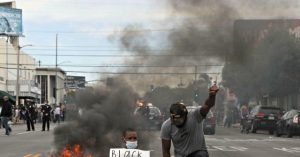Los Angeles County sheriff’s deputies shut down a months-old protest encampment in Grand Park early Sunday in a move that activists branded as “misdirected anger” over a shooting, hours earlier, that left two deputies fighting for their lives.
The encampment first appeared in Grand Park across from City Hall in June amid protests over the death of George Floyd. It was cleared out around 3 a.m. after deputies declared an unlawful assembly in the area, the Sheriff’s Department said in a statement.
Authorities said the action was taken because of “deteriorating conditions” in the park. They denied it was connected to the ambush shooting of two deputies in Compton late Saturday or recent demonstrations against the department in South L.A. after deputies shot and killed bicyclist Dijon Kizzee.
Protests near the South L.A. sheriff’s station over Kizzee’s killing have drawn hundreds of demonstrators, including those affiliated with Black Unity L.A., the protest group that had also been running the encampment.
In its statement, the Sheriff’s Department alleged that “illegal narcotic activity, vandalism and graffiti” had become an issue near the encampment. About 25 protesters and 11 homeless people were in the encampment when it was cleared. One person was arrested for trespassing, officials said.
Carolyn Gomez, who coordinates legal observers for the National Lawyers Guild in Los Angeles, some of whom were in the park, said the Sheriff’s Department failed to issue a dispersal order and used “excessive force” against demonstrators, though she could not offer specifics. A Sheriff’s Department spokeswoman did not respond to a request for comment about the use of force.
Gomez alleged that Sean Beckner-Carmitchel, an independent journalist and activist who has been live streaming events from the encampment on Instagram under the handle “acatwithnews,” was seriously injured by less-lethal projectiles and knocked unconscious during the Sheriff’s Department’s actions.
For months, the group had been occupying a fenced-off section of Grand Park near City Hall in the shadow of the county’s largest courthouse, hosting movie nights, training seminars for medical aid during protests and other educational events. The group’s demands included an end to the practice of qualified immunity for police, which shields officers from civil liability for some of their actions; eliminating the L.A. Unified School District’s campus police; increasing de-escalation training for law enforcement; and opening all police discipline records to the public.
Organizers with the group told the Los Angeles Times in August that about 30 people were directly involved with the site, with about 15 spending their nights there. The encampment had its own kitchen and a donated library, as well as lounges erected inside the area it had fortified with barricades and wooden palettes. Members could often be seen giving food to nearby homeless people and had also organized visits to skid row to provide services.
The area surrounding the encampment, however, had become increasingly filled with homeless men and women over the summer, and had begun drawing the ire of community leaders. The downtown L.A. Neighborhood Council expressed frustration with the encampment, and some local residents grew worried after Los Angeles police responded to a reported sexual assault in a public restroom near Spring Street earlier this summer.
Around the same time, signs warning that the encampment was illegal were posted near Grand Park at the direction of the Sheriff’s Department.


















